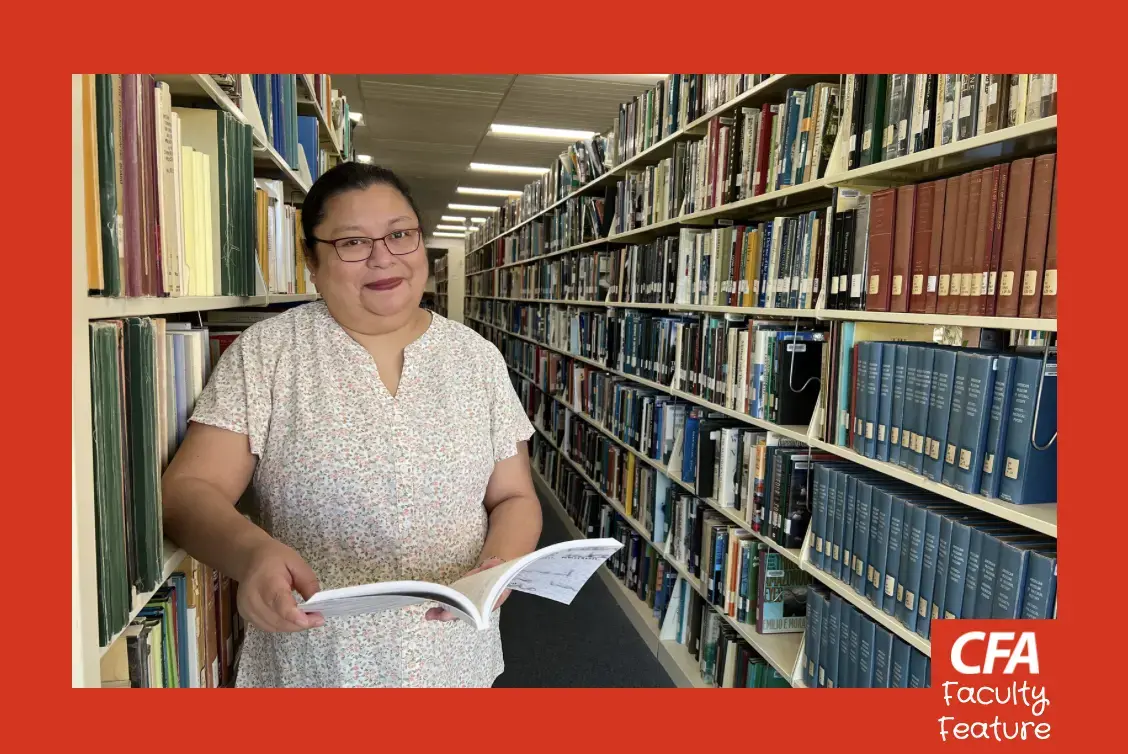Faculty Feature: Melissa Cardenas-Dow Organizes Through Anti-Racism and Social Justice Principles
Social Sciences Librarian Melissa Cardenas-Dow didn’t expect her job at Sacramento State would include envisioning a world without campus police. “I came here because I needed healthcare,” she reflected.
“Coming from a very middle-class, immigrant, assimilationist family, I never really foresaw becoming an abolitionist,” she laughed, gazing into the past.

Cardenas-Dow is also a campus representative on our Council for Racial & Social Justice. She was hungry for conversations on race, power, class, and campus police at CSU and found them.
Organizing is on her mind as the union prepares for bargaining this May with an increasingly out-of-touch CSU administration. Thinking about her advocacy, “I was just telling my husband what sort of commitment I wanted.” Cardenas-Dow told her husband, “I don’t want to commit the way a chicken commits to breakfast. I want the type of commitment that a pig gives to breakfast!”
She sees her organizing role as helping people open their perspectives and raise their awareness and consciousness as she continues challenging herself to see things in new ways.
At times, Cardenas-Dow has heard her colleagues doubt pursuing anti-racism and social justice (ARSJ) goals in bargaining. They often argue that the union should only focus on wages and benefits. She reminds those colleagues that “we can’t do this work with integrity if we leave things at the door.”
Cardenas-Dow explained that no one doubts the importance of demanding and preserving healthcare as part of bargaining “because we have to take care of ourselves and the people we care about.” She firmly believes that “being able to care for our health shouldn’t be precarious.” For Cardenas-Dow, combating racism is equivalent to expecting healthcare, “if there are acts of racism and bigotry, for my health, I need to be able to take care of that, too.”
Fighting for an improved contract and being active in the union is necessary because “what’s at stake is our survivability. This is our livelihood,” she asserted.
For Cardenas-Dow, day to day racism can feel thick, weighing down the atmosphere. “It’s in the air, and the HVAC system in the library is not that great,” she giggled mischievously.
One effort by Cardenas-Dow to cleanse the air is a display case in the library with resources about alternatives to campus policing that students, scholars, and the community can check out through a QR code. “Many scholars have written about the need for alternatives to campus policing,” said Cardenas-Dow in a previous post. “Their writings and recommendations are represented in this display.” The statement “We Keep Each Other Safe” anchors the exhibit.
Having recently attended CFA’s annual Equity Conference, Cardenas-Dow felt inspired by the words of poet, CFA member, and CSU professor Jason Magabo Perez. She realized creating spaces in the library to confront challenging subjects allows tenderness and introspection. “It’s the tenderness that offers values. That’s the tenderness that allows us to grow into ourselves,” Cardenas-Dow said.
In designing the library display, Cardenas-Dow sees she has “reached back into what pushed me when I was an undergrad.” She wants to develop the same opportunities for undergraduates like her, “just pay it forward.”
In thinking about her consciousness raising, the roots of her perspective are grounded in Ethnic Studies. When she was an undergrad at San Francisco State, she earned a minor in Asian American Studies. As a younger person, she wasn’t politically engaged. Growing up, she felt pressured to pursue a high-income career. There was no room for introspection. However, her Ethnic Studies courses gave her a template to see the world through her identity. “That was my awakening,” Cardenas-Dow said, beaming.
A 2018 incident when Sacramento State Professor David Moore had the police called on him was a significant moment for Cardenas-Dow to question the role of police and the racism it perpetuates. She couldn’t understand that those she cared about and interacted with could be treated with hostility. Her curiosity, undeterred, led her to review campus police budgets. It was an opportunity to widen her perspective.
Cardenas-Dow began to wonder why Sacramento State doesn’t offer life-affirming services instead of defensive practices like the police. She remembers when in May 2022, CSU Long Beach Professor Steven Osuna accused campus police of racial profiling and discrimination against him when an officer refused to unlock his office door.
For Cardenas-Dow, the incident with Osuna happened “because the policy is to call the police, and all the police are going to do is be police!” She thought and then added, “That needed a locksmith, not police.”
Cardenas-Dow started at Sacramento State determined to compartmentalize and stick to doing her job. Through CFA and her participation on the Council for Racial & Social Justice, she remembered the importance of bringing all of herself, her questions, concerns, and curiosities into the work.
“At CFA, we are saying that we don’t have to assimilate, try to be white, to get ahead and do the work that matters.”
Join California Faculty Association
Join thousands of instructional faculty, librarians, counselors, and coaches to protect academic freedom, faculty rights, safe workplaces, higher education, student learning, and fight for racial and social justice.